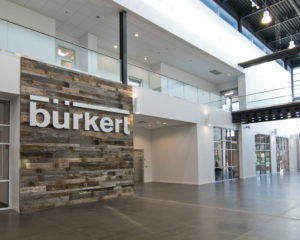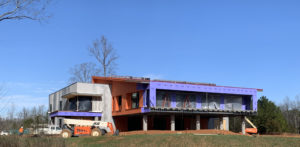International companies contribute to the boom in the Carolinas construction market — and they’re bringing their own style
The Charlotte area has become a magnet for internationally owned companies. According to a 2019 report from the Charlotte Regional Business Alliance, the Charlotte region boasts more than 1,000 internationally owned businesses from more than 45 countries, employing more than 82,000 people. Leading the way is Germany, with 217 companies in the area employing close to 21,000 people. This influx of international companies has contributed to a construction boom.
“Many international companies don’t like the standard box building, so they want to build their own,” said Sven Gerzer, vice president of business recruitment for Europe, India and North America for the Charlotte Regional Business Alliance. “From a construction perspective, these are great customers because they want to build according to their exact specifications.”
“Many of the international companies Edifice partners with include both office and manufacturing or distribution components within a single facility. The inclusion of a flagship office or showroom component in the front a building, along with a more functional component as the back of house, sometimes differs from the approach taken by many domestic companies whose expansion is largely focused on boosting supply chain or manufacturing capabilities,” said Sloan Kormelink director of business development with Edifice. Pester pac automation, a secondary packaging company in the pharmaceutical and cosmetics industry chose this layout in order to showcase its brand and a location where the landscape had a natural feel. Currently under construction, Pester pac automation’s facility is surrounded by trees and includes a manmade water basin. German-based Bürkert Fluid Control Systems, a leading manufacturer of measurement and control systems for liquids and gases, also chose this route for its 168,000-square foot facility in Huntersville. The manufacturing portion takes up more than 100,000 square feet, while the front 68,000 square feet includes administrative areas, training facilities and an indoor fitness center. The company also selected a large site to support future growth with views of natural landscape.

International companies often pursue a design-forward facility that include natural lighting, unique building materials, and an elevated demand for quality construction according to Kormelink. Additionally, they’re interested in sustainability and environmental stewardship during and after construction.
Kormelink said many international companies prefer to have a lot of natural light in their buildings, so an abundance of windows is a necessity, both for offices and manufacturing spaces.
Charlotte’s appeal
“There’s a combination of many factors that lead to international companies choosing the Charlotte region,” said Gerzer. These appealing factors include:
- Workforce – Charlotte offers a skilled and trained workforce, both in terms of quantity and qualifications.
- Logistics – More than 35 direct international flights are available through Charlotte Douglas International Airport to global business hubs like Munich, Frankfurt, London, and more, and the area offers ease of access to ports on the Eastern seaboard without the high costs of being in close proximity.
- Business costs – Energy and land acquisition costs are lower than many areas in country.
- Taxes – At 2.5%, North Carolina has one of the lowest corporate tax rates in the nation.
- Quality of life – Charlotte has an internationally diverse population; nearly 257,000 foreign-born residents reside in the area, according to Gerzer.
- International recruitment – The Charlotte Regional Business Alliance has been actively recruiting in Europe for 40 years and Asia for 10, and has developed connections in those markets.
Why one German firm chose Charlotte
Pester pac automation is relocating its North American headquarters from New Jersey to Huntersville and chose Edifice to construct its new building.
According to Ryan Braun, vice president at Pester pac automation, the company chose the Charlotte area due to its:
- Ease of travel to its headquarters – the nearby international airport provides direct flights to Munich.
- Corporate tax rate and Charlotte’s goal to reduce it.
- Central location to Pester pac automations’s customer base – 80% of the company’s customers are within a two-hour flight.
- Plentiful pool of technical labor in the right specialties.
- Eight internationally focused private schools and the availability of classes for German and Austrian students – Pester pac automation typically has a number of employees from Germany at its U.S. headquarters and needed the ability to easily shift children’s schooling from Germany to the U.S.
“We wanted our U.S. headquarters to align with our corporate identity,” said Braun. “We’ve positioned ourselves as a high-end, high-quality vendor, and we wanted our building to reflect that.”

Pester pac automation’s domestic headquarters, which will house both the company’s offices and manufacturing space, is a two-story facility on a 20,000-square-foot footprint on 9.7 acres in a pre-existing industrial park. It has obscure angles, a large angled roof and elevated office space over a man-made water basin, along with an outdoor employee area. “We had a lot of challenging build requests,” said Braun. In addition to requesting an abundance of natural light, Pester pac automation wanted to bring in a sense of natural elements. “From just about every vantage point in the building you can see trees all around us,” said Braun. “It feels like you’re surrounded by the woods, which is a unique perspective in an industrial space.”
In 2019, 17% of Edifice’s revenue was with international companies. Interest from international companies looking to build headquarters in the Carolinas remains strong. “We enjoy working on these projects because they have a positive impact on communities and the buildings are uniquely reflective of our client’s organization,” said Kormelink.
BY LAURIE GARRISON, CONTRIBUTING WRITER |

